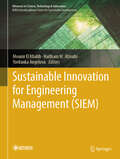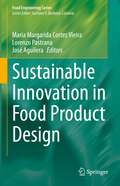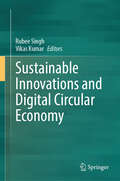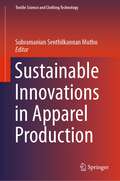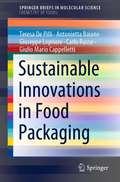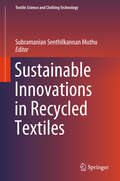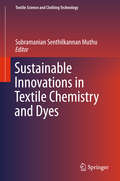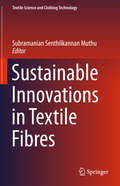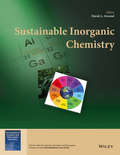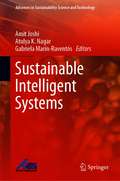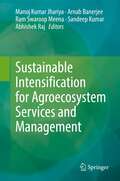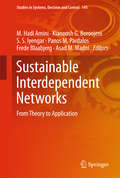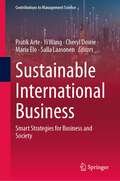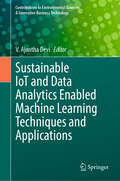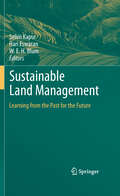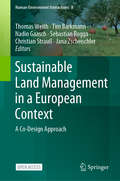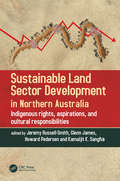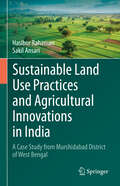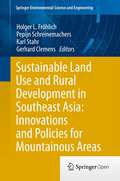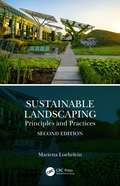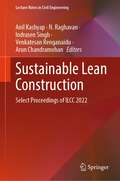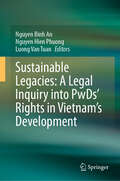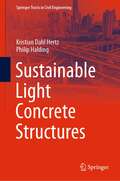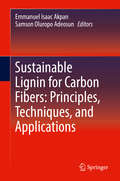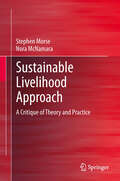- Table View
- List View
Sustainable Innovation for Engineering Management (Advances in Science, Technology & Innovation)
by Haitham M. Alzoubi Mounir El Khatib Yordanka AngelovaThis book dives into topics like renewable energy adoption, how AI and IoT can create smarter systems, and the transition toward more sustainable infrastructures. The SIEM book offers an in-depth look at how sustainable innovation is transforming engineering management, providing readers with practical insights and strategies. It focuses on advanced technologies, data-driven approaches, and circular economy concepts, aiming to tackle the key challenges that today's engineers and managers are facing. With a focus on the circular economy, it explores how engineering leaders can integrate sustainability into their processes to achieve both efficiency and growth. Practical examples and real-world cases are also included, showing how companies around the world are balancing innovation with environmental goals. In an era where businesses are under pressure to reduce their environmental impact while staying competitive, this book gives actionable tools and strategies for achieving both. From big data applications in decision-making to AI-powered solutions, Sustainable Innovation for Engineering Management (SIEM) equips readers with the knowledge they need to succeed in this evolving field. Designed for professionals, academics, and students, this book creates a bridge between theory and real-world practices. Whether you are working to solve current industry problems or looking to inspire sustainable change within your organization, this book is a valuable resource for driving innovation and fostering sustainability together.
Sustainable Innovation in Food Product Design (Food Engineering Series)
by Maria Margarida Cortez Vieira Lorenzo Pastrana José AguileraThis book comes out of the 12th Iberoamerican Congress of Food Engineering, which took place at the University of Algarve in Faro, Portugal in July 2019. It includes the editors' selection of the best research works from oral and poster presentations delivered at the conference. The first section is dedicated to research carried out on SUSTAINABLE ALTERNATIVES TO CHEMICAL ADDITIVES TO EXTEND SHELF LIFE, with special emphasis on animal products. The second section discusses recent research in SUSTAINABLE NEW PRODUCT DEVELOPMENT. The third section delves into the development of PLANT-BASED ALTERNATIVES TO DAIRY AND GLUTEN BASED CEREALS. The fourth section tackles CONSUMER BEHAVIOR regarding food products with new sources of protein (e.g. insects) or new sources of important nutrients (e.g. seaweeds) and the fifth discusses the VALORIZATION OF BY-PRODUCTS IN THE FOOD INDUSTRY (from fruits and wine making). For food engineers, food technologists, and food scientists looking to stay up-to-date in this field of sustainable food engineering, Sustainable Innovation in Food Product Design is the ideal resource.
Sustainable Innovations and Digital Circular Economy
by Vikas Kumar Rubee SinghThis book explores how circular economy can be applied globally, and what its reshaping potential could prove for industries, communities, and for our lives in future. It discusses how the concept of a circular economy offers an innovative and transformative approach that not only mitigates the negative impacts of traditional linear models, but also unlocks a vast potential for growth and social progress that is underutilized. In order to achieve the objectives of this book, the design and conceptualization have been based on the advantages, as well as the commitment of digital circular economy to maintain environmental sustainability as per the SDGs. With the goal of inspiring readers and policymakers alike to adopt sustainable practices and drive positive change for their respective industries, this book presents to the readers and policymakers the possibilities of sustainable practices. Additionally, it describes how embracing a digital circular economy can reduce waste, increase resource efficiency, and make the economy more resilient and regenerative. Providing practical examples and policy recommendations along with a strategic roadmap, this book provides useful insights and support in defining a path to a more sustainable future.
Sustainable Innovations in Apparel Production (Textile Science And Clothing Technology Ser.)
by Subramanian Senthilkannan MuthuThere have been a lot of innovations in making the garment or apparel production sector sustainable. This book highlights sustainable innovations in the apparel production sector, which is the final destination in the textile production segment. Measuring sustainability in clothing is one of the inevitable areas to deal with when it comes to sustainable apparel production, which is also highlighted here.
Sustainable Innovations in Food Packaging (SpringerBriefs in Molecular Science)
by Carlo Russo Teresa De Pilli Antonietta Baiano Giuseppe Lopriore Giulio Mario CappellettiThis book explores the latest advances in the sustainable production of packaged foods. Packaging plays an important role in sustainable food production and consumption in industrialized countries, where there is an increasing pressure to reduce the environmental impact of packaged foods. For example, the European Union recommends packaging from renewable sources, with a focus on bio-based materials. Sustainable packaging processes guarantee the reuse of the entire waste material and at the same time avoid the loss of food safety and quality during storage by preventing food-borne diseases and chemical contamination. Furthermore, the dramatic problem of plastic waste accumulation and the conservation of oil and food resources need to be taken into consideration. This book presents eco-friendly packaging strategies to reduce food and plastic waste and address the end-of-life issues of persistent materials. It particularly focuses on the production of biodegradable microbial polymers and the use of by-products and waste from the agricultural and food industries. These strategies promote an innovative and productive waste-based food packaging economy, separating the food packaging industry from fossil reserves and allowing bio-polymers to return to the soil. Lastly, the book covers life-cycle assessment, life-cycle costing, and externality assessment to help readers understand the economical reliability of the innovations presented.
Sustainable Innovations in Recycled Textiles (Textile Science And Clothing Technology Ser.)
by Subramanian Senthilkannan MuthuThis book highlights the environmental and economic benefits of recycling in textiles and fashion; vis-a-vis virgin textiles. Recycling plays an inevitable part when it comes to sustainable innovations in textiles and fashion sector. As basic information pertaining to the benefits, challenges of recycling in textiles are discussed to the sufficient extent in the literature, this book deals with the innovative at the same time, sustainable products made from the recycled textiles.
Sustainable Innovations in Textile Chemistry and Dyes (Textile Science And Clothing Technology Ser.)
by Subramanian Senthilkannan MuthuThis book details two elements of textile chemistry namely- sustainable/eco-friendly dyes and green chemistry. It presents latest topics in sustainable dyeing techniques, low impact dyeing methods, wool dyeing techniques and green chemistry. Certain case studies are also highlighted.
Sustainable Innovations in Textile Fibres (Textile Science And Clothing Technology Ser.)
by Subramanian Senthilkannan MuthuThis book highlights the innovations in textile fibres, that is the starting point of the supply chain. There are numerous innovations made in terms of making the existing fibres sustainable and also to discover new sustainable fibres. This book deals with those innovative sustainable textile fibres in detail. It also presents an overview of various current textile fibres, their issues associated with sustainability and how new, sustainable fibres overcome those issues. Finally it discusses the challenges and implications of these sustainable fibres on technical and economic fronts.
Sustainable Inorganic Chemistry (EIC Books)
by David A. AtwoodThe Earth's natural resources are finite and easily compromised by contamination from industrial chemicals and byproducts from the degradation of consumer products. The growing field of green and sustainable chemistry seeks to address this through the development of products and processes that are environmentally benign while remaining economically viable. Inorganic chemistry plays a critical role in this endeavor in areas such as resource extraction and isolation, renewable energy, catalytic processes, waste minimization and avoidance, and renewable industrial feedstocks. Sustainable Inorganic Chemistry presents a comprehensive overview of the many new developments taking place in this rapidly expanding field, in articles that discuss fundamental concepts alongside cutting-edge developments and applications. The volume includes educational reviews from leading scientists on a broad range of topics including: inorganic resources, sustainable synthetic methods, alternative reaction conditions, heterogeneous catalysis, photocatalysis, sustainable nanomaterials, renewable and clean fuels, water treatment and remediation, waste valorization and life cycle sustainability assessment.The content from this book will be added online to the Encyclopedia of Inorganic and Bioinorganic Chemistry.
Sustainable Intelligent Systems (Advances in Sustainability Science and Technology)
by Amit Joshi Atulya K. Nagar Gabriela Marín-RaventósThis book discusses issues related to ICT, intelligent systems, data science, AI, machine learning, sustainable development and overall their impacts on sustainability. It provides an overview of the technologies of future. The book also discusses novel intelligent algorithms and their applications to move from a data-centric world to sustainable world. It includes research paradigms on sustainable development goals and societal impacts. The book provides an overview of cutting-edge techniques toward sustainability and ideas to help researchers who want to understand the challenges and opportunities of using smart management perspective for sustainable society. It serves as a reference to wide ranges of readers from computer science, data analysts, AI technocrats and management researchers.
Sustainable Intensification for Agroecosystem Services and Management
by Sandeep Kumar Ram Swaroop Meena Manoj Kumar Jhariya Arnab Banerjee Abhishek RajThis edited book provides a comprehensive account of the sustainable intensification process through various forms of case studies and scientific approaches studied across the globe. It also focuses on the agroecosystem services and their subsequent management for ecological integrity. The book helps to understand the interconnection of food, nutrition, economic growth, and environmental security on the planet. It provides comprehensive information with photographic illustration and various other forms of scientific databases on sustainable intensification of agroecosystems. The book also supports decision-making, strategies, and policy formulation for effective implementation of sustainable intensification towards higher productivity along with maintenance and management of agroecosystem services. Proper sustainable intensification of agroecosystem services and their management by maintaining ecological harmony is the future prospect for sustainable development. High input agriculture gives rise to a high-energy footprint, agricultural pollution, resource depletion, loss of agro-biodiversity, and decline of human health. Through this connection, the sustainable intensification approach addresses the advanced food security, sustainability, and overall prosperity of humankind. The book is helpful for both undergraduate and postgraduate students, policymakers, the farming community, as well as the scientific community across the globe to understand the concept of sustainable intensification and its application in relevant fields for proper management of agroecosystems services.
Sustainable Interdependent Networks: From Theory To Application (Studies In Systems, Decision And Control #145)
by Panos M. Pardalos Frede Blaabjerg Kianoosh G. Boroojeni M. Hadi Amini S. S. Iyengar Asad M. MadniThis book focuses on the theory and application of interdependent networks. The contributors consider the influential networks including power and energy networks, transportation networks, and social networks. The first part of the book provides the next generation sustainability framework as well as a comprehensive introduction of smart cities with special emphasis on energy, communication, data analytics and transportation. The second part offers solutions to performance and security challenges of developing interdependent networks in terms of networked control systems, scalable computation platforms, and dynamic social networks. The third part examines the role of electric vehicles in the future of sustainable interdependent networks. The fourth and last part of this volume addresses the promises of control and management techniques for the future power grids.
Sustainable International Business: Smart Strategies for Business and Society (Contributions to Management Science)
by Yi Wang Maria Elo Pratik Arte Cheryl Dowie Salla LaasonenThis is a unique book that adopts a global approach to studying international business. It stimulates research and rethinking among scholars and practitioners to understand how businesses operate internationally into lucrative markets, and their role in sustainable business growth, glocal value creation, and economic development. It provides insights into how international firms, entrepreneurs, family businesses, and other stakeholders balance the act of value creation and conducting sustainable and ethical business. The book covers economic, social, and environmental dimensions of sustainability such as poverty alleviation through FDI and remittances, diversity and inclusion in management, and ethical governance to value creation for stakeholders and profit maximization through sustainable firm growth, entrepreneurial initiatives, and sustainable business models. It addresses capacity building and the grand challenges that international business needs to develop solutions for. The chapters offer multiple types of contributions including conceptual and theoretical works, literature reviews, and empirical (qualitative and quantitative) studies. The authors, and the topics included, provide a wide international representation and illustrate multi-layered sustainable business perspectives that cover developing, emerging, and developed country contexts as well as multiple directions of international business flows.
Sustainable IoT and Data Analytics Enabled Machine Learning Techniques and Applications (Contributions to Environmental Sciences & Innovative Business Technology)
by V. Ajantha DeviThis book provides a structured presentation of machine learning related to vision, speech, and natural language processing. It addresses the tools, techniques, and challenges of machine learning algorithm implementation, computation time, and the complexity of reasoning and modeling of different types of data. The book covers diverse topics such as semantic image segmentation, deep visual residual abstraction, brain–computer interfaces, natural language processing, traffic and signaling, driverless driving, and radiology. The majority of smart applications have a need for a sustainable Internet of things (IoT) and artificial intelligence. Active research trends and future directions of machine learning under big data analytics are also discussed. Machine learning is a class of artificial neural networks that have become dominant in various computer vision tasks, attracting interest across a variety of domains as they are a type of deep neural networks efficient in extracting meaningful information from visual imagery.
Sustainable Land Management
by Selim Kapur Hari Eswaran Winfried E.H. BlumSoil quality is threatened by many human-induced activities, but can also be improved by good land management. In the relatively short history of mankind on earth, the landscape and soils of the world have been drastically modified from their "natural " state. Landscapes altered by man's activities are termed "Anthroscapes" which are inextricably linked to culture and history. The challenges for today's scientists are to devise and implement sustainable land management strategies in order to preserve the land for the benefit of future generations. This book is a valuable compendium of the research experiences so far gained in studies of the context and concept of the "Anthroscape" and highlights the potential future contributions of such research to sustainable development.
Sustainable Land Management in a European Context: A Co-Design Approach (Human-Environment Interactions #8)
by Thomas Weith Tim Barkmann Nadin Gaasch Sebastian Rogga Christian Strauß Jana ZscheischlerThis open access book presents and discusses current issues and innovative solution approaches for land management in a European context. Manifold sustainability issues are closely interconnected with land use practices. Throughout the world, we face increasing conflict over the use of land as well as competition for land.Drawing on experience in sustainable land management gained from seven years of the FONA programme (Research for Sustainable Development, conducted under the auspices of the German Federal Ministry of Education and Research), the book stresses and highlights co-design processes within the “co-creation of knowledge”, involving collaboration in transdisciplinary research processes between academia and other stakeholders. The book begins with an overview of the current state of land use practices and the subsequent need to manage land resources more sustainably. New system solutions and governance approaches in sustainable land management are presented from a European perspective on land use. The volume also addresses how to use new modes of knowledge transfer between science and practice. New perspectives in sustainable land management and methods of combining knowledge and action are presented to a broad readership in land system sciences and environmental sciences, social sciences and geosciences.
Sustainable Land Sector Development in Northern Australia: Indigenous rights, aspirations, and cultural responsibilities
by Jeremy Russell-Smith, Howard Pedersen, Glenn James, and Kamaljit K. SanghaKey Features: Provides clear and authoritative recommendations for managing fire in ecological and social contexts Authors are all international leaders in their fields and include not only academics but also leaders of Indigenous communities Explains Indigenous cultural and knowledge systems to a degree that has rarely been accessible to lay and academic readers outside specialized disciplines like Anthropology Responds to growing need for new approaches to managing human-ecological systems that are in greater sympathy with Australia’s natural environments/climate, and value the knowledge of Indigenous people Timely for scholarly and interest groups intervention, as the Australian government is again looking to ‘develop the north' Sustainable Land Sector Development in Northern Australia sets out a vision for developing North Australia based on a culturally appropriate and ecologically sustainable land sector economy. This vision supports both Indigenous cultural responsibilities and aspirations, as well as enhancing enterprise opportunities for society as a whole. In the past, well-meaning if often misguided policy agendas have failed - and continue to fail - North Australians. This book helps breach that gap by acknowledging and harnessing Indigenous cultural strengths and knowledge systems for looking after the country and its people, as part of a smart, novel and diversified ecosystem services economy.
Sustainable Land Use Practices and Agricultural Innovations in India: A Case Study from Murshidabad District of West Bengal
by Hasibur Rahaman Sakil AnsariThis book discusses sustainable land use practices in relation to agricultural innovation, with a local focus by land size classes on the Murshidabad District of West Bengal. Chapter 1 presents the different aspects of the physical and cultural set-up of the Murshidabad district. Chapter 2 provides a background and overview of sustainable agricultural land use and development. Chapter 3 presents the dynamics of sustainable agricultural land use and cropping patterns at the local level. Chapter 4 discusses the overall agricultural innovations concerning the input and output aspects of a spatial context under different land size classes. Chapter 5 covers the relationship between sustained agricultural land use and agricultural innovations. Chapter 6 analyses agricultural innovations and agricultural land use based on household survey data in selected sample villages. Chapter 7 uses a SWOT analysis to understand contemporary issues and challenges of agriculture innovation.
Sustainable Land Use and Rural Development in Southeast Asia: Innovations and Policies for Mountainous Areas (Springer Environmental Science and Engineering)
by Gerhard Clemens Karl Stahr Pepijn Schreinemachers Holger L. FröhlichThis book is based on the findings of a long-term (2000-2014) interdisciplinary research project of the University of Hohenheim in collaboration with several universities in Thailand and Vietnam. Titled Sustainable Land Use and Rural Development in Mountainous Areas in Southeast Asia, or the Uplands Program, the project aims to contribute through agricultural research to the conservation of natural resources and the improvement of living conditions of the rural population in the mountainous regions of Southeast Asia. Having three objectives the book first aims to give an interdisciplinary account of the drivers, consequences and challenges of ongoing changes in mountainous areas of Southeast Asia. Second, the book describes how innovation processes can contribute to addressing these challenges and third, how knowledge creation to support change in policies and institutions can assist in sustainably develop mountain areas and people's livelihoods.
Sustainable Landscaping: Principles and Practices
by Marietta LoehrleinSustainable landscaping involves a set of practices implemented by landscape practitioners to help solve environmental concerns. Continuing in the tradition of its predecessor, the second edition of Sustainable Landscaping: Principles and Practices examines underlying landscaping issues that adversely affect the environment and illustrates alternative methods that result in positive outcomes. This textbook examines all phases of landscaping in both residential and commercial environments, from design to construction and implementation to maintenance. Firmly anchoring landscaping practices in the context of sustainability, this book explores topics including choosing appropriate plants and using plants for specific effects, such as shading, water quality and quantity, soil health and optimal preservation techniques, pesticide usage and its inherent dangers, energy consumption, and resource management and waste reduction. Sustainable Landscaping also provides a thorough grounding in pertinent issues and terminology for each topic, followed by practical solutions applied by landscape professionals. Each chapter includes learning objectives and case studies of actual sustainable landscape activities. Contains updated government statistics and data, graphs, tables, and color photographs throughout. Provides background information and sustainable solutions for students, homeowners, and landscaping professionals to effectively design and manage landscapes. Author Dr. Marietta Loehrlein is a Professor Emeritus of Horticulture and Landscaping at Western Illinois University in Macomb, IL, USA. While there, she developed a new course, "Sustainable Landscaping," and wrote the first edition of this textbook, which was also the first of its kind to address the subject.
Sustainable Lean Construction: Select Proceedings of ILCC 2022 (Lecture Notes in Civil Engineering #383)
by Anil Kashyap N. Raghavan Indrasen Singh Venkatesan Renganaidu Arun ChandramohanThis book presents select proceedings of the Indian Lean Construction Conference (ILCC 2022) with adoption and implementation cases of lean concepts across Indian construction projects. The topics covered are lean culture and behavior, lean in sustainable and green technologies, lean supply chain management and offsite construction, lean in public sector, lean in modern construction techniques, etc. The book also discusses various properties and performance attributes of lean tools and techniques across various construction practices in infrastructure and real estate projects. The book is a valuable reference for researchers and construction professionals interested in Lean Construction.
Sustainable Legacies: A Legal Inquiry into PwDs’ Rights in Vietnam’s Development
by Nguyen Binh An Nguyen Hien Phuong Luong Van TuanThis book offers a comprehensive exploration of Vietnam's legal landscape through the lens of inclusivity. Covering topics ranging from educational rights and workplace inclusivity to corporate social responsibility and transport accessibility, this book provides a nuanced understanding of the challenges and opportunities facing PwDs in Vietnam. What sets this book apart is its interdisciplinary approach, weaving together legal analysis, policy evaluation and real-world case studies to provide practical insights for policymakers, legal practitioners, academics, and advocates. With a focus on actionable recommendations, it is a valuable resource for anyone interested in promoting sustainable development and social justice for persons with disabilities. Accessible yet rigorous, the book is aimed at a wide audience, from legal practitioners and policymakers to disability rights activists and academics. It serves as both a roadmap for legal reform and a catalyst for promoting a more inclusive and just society
Sustainable Light Concrete Structures (Springer Tracts in Civil Engineering)
by Kristian Dahl Hertz Philip HaldingThe book presents new technologies for easy and economical construction of light concrete structures saving materials and CO2. The new super-light technology allows a designer to place forces, where it is optimal, and save material everywhere else. The book also supports this “Direct Engineering” principle with a number of new details and structural principles. The new pearl-chain technology makes it possible to design optimal shapes such as arches, vaults, cupolas, floating tunnels, and shells etc. from inexpensive, and mass-produced components. The new super-light deck-elements presented in the book are now produced in six factories in Denmark, Finland, and USA, and the number is increasing. The book will be of interest for all structural engineers, who would like to save materials, CO2 and optimize their structures, for students learning about the new technologies, and for contractors and architects, who want to investigate new building technologies.
Sustainable Lignin for Carbon Fibers: Principles, Techniques, and Applications
by Emmanuel Isaac Akpan Samson Oluropo AdeosunThis book is designed to provide wide understanding of lignin carbon fiber processes, chemistry, mechanisms, and techniques that will help in further development of lignin carbon fiber for automobile, aerospace, marine, and sports equipment applications. Each step in the processing of lignin carbon fibers is presented as a separate chapter so that issues concerning the processes are exhaustively discussed. Basic scientific principles governing each stage of lignin carbon fiber processing, current state of research and mechanisms behind the processes are illustrated for better understanding. This is the first book to address the entire scope of lignin carbon fiber processing including; extraction, quantification, purification, melt processing, stabilization, carbonization, optimization of processes, and characterization. Presents detailed information on the chemistry, processing, principles and properties of bio-sourced lignin for carbon fiber production;Highlights techniques of recovery and properties of lignin from agricultural waste sources;Addresses applications in automobile, aircraft, marine, and sport industries;Provides insight into the lignin complex macromolecular system, the role of lignin chemistry as it relates to carbon fiber production and the evolution of lignin carbon fiber structure during processing.
Sustainable Livelihood Approach
by Stephen Morse Nora McnamaraWe all view the ubiquitous term 'sustainability' as a worthwhile goal. But how can we apply the principles of sustainability in the real world, at the sharp end of communities in developing nations where income insecurity is the troubled norm? This volume provides some practical answers, explaining the precepts of the 'sustainable livelihood approach' (SLA) through the case study of a microfinance scheme in Africa. The case study, centered around the work of the Catholic Church's Diocesan Development Services organization, involved an SLA implemented over two years designed in part to help enhance its existing microfinance operation through closer links between local communities and international donors. The book's central conclusion is that we must move beyond the concept of sustainable livelihood itself, with its in-built polarities between developed and developing nations, and embrace a more global notion of 'sustainable lifestyle'; a more nuanced and inclusive approach that encompasses not just how we make a sustainable living, but how we can live sustainable lives.
